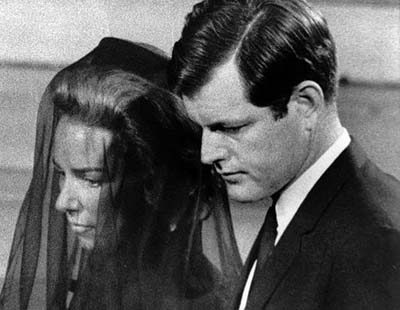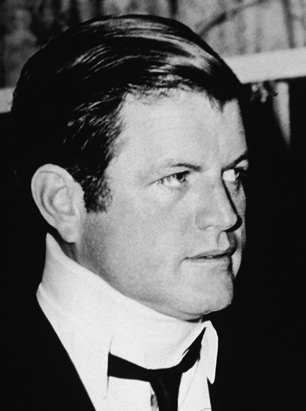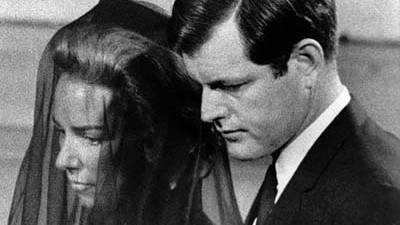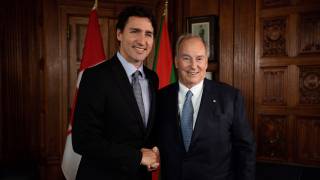Ted Kennedy: Family senator, patriarch, dead at 77
Ted Kennedy: Family senator, patriarch, dead at 77By David Espo | WashingtonPost.com
In the quiet of a Capitol elevator, one of Edward M. Kennedy's fellow lawmakers asked whether he had plans for a family Thanksgiving away from the nation's capital. No, the Massachusetts senator said with a shake of his head, and mentioned something about visiting his brothers' gravesites at Arlington National Cemetery.
In his half-century in the public glare, Kennedy was, above all, heir to a legacy - as well as a hero to liberals, a foil to conservatives, a legislator with few peers.
Alone of the Kennedy men of his generation, he lived to comb gray hair, as the Irish poet had it. It was a blessing and a curse, as he surely knew, and assured that his defeats and human foibles as well as many triumphs played out in public at greater length than his brothers ever experienced.
He was the only Kennedy brother to run for the White House and lose. His brother John was president when he was assassinated in 1963 a few days before Thanksgiving; Robert fell to a gunman in mid-campaign five years later. An older brother, Joseph Jr., was killed piloting a plane in World War II.
Runner-up in a two-man race for the Democratic nomination in 1980, this Kennedy closed out his failed candidacy with a speech that brought tears to the eyes of many in a packed Madison Square Garden.
"For me, a few hours ago, this campaign came to an end," he said. "For all those whose cares have been our concern, the work goes on, the cause endures, the hope still lives and the dream shall never die."
He was 48, older than any of his brothers at the time of their deaths. He lived nearly three more decades, before succumbing to a brain tumor late Tuesday at age 77.

Ethel Kennedy is escorted by her brother-in-law, Sen. Edward Kennedy, to their pew in St. Patrick's Cathedral in New York for the funeral services of Sen. Robert F. Kennedy, the morning of June 8, 1968.
(AP Photo/stf)
That convention speech was a political summons, for sure. But to what?
Kennedy made plans to run for president again in 1984 before deciding against it. By 1988, his moment had passed and he knew it.
He turned his public energies toward his congressional career, now judged one of the most accomplished in the history of the Senate.
"I'm a Senate man and a leader of the institution," he said more than a year ago in an Associated Press interview. He left his imprint on every major piece of social legislation to pass Congress over a span of decades. Health care, immigration, civil rights, education and more. Republicans and Democrats alike lamented his absence as they struggled inconclusively in recent months with President Barack Obama's health care legislation.
He was in the front ranks of Democrats in 1987 who torpedoed one of President Ronald Reagan's Supreme Court nominees. "Robert Bork's America is a land in which women would be forced into back-alley abortions, blacks would sit at segregated lunch counters, rogue police could break down citizens' doors in midnight raids, children could not be taught about evolution," he said at the time.
It was a single sentence that catalogued many of the issues he - and Democrats - devoted their careers to over the second half of the 20th century.
A postscript: More than a decade later, President Bill Clinton nominated a former Kennedy aide, Stephen Breyer, to the high court. He was confirmed easily.
---
There were humiliations along the way, drinking and womanizing, coupled with the triumphs that the Kennedy image-makers were always polishing. After the 1980 presidential campaign, Camelot took another hit when he divorced. He later remarried, happily.
In later years came grumbling from fellow Democrats that his political touch had failed him, and that he was too eager to strike a deal with President George W. Bush on education and Medicare.
"I believe a president can make a difference," he said over and over in that campaign of 1980, at a time the country was suffering from crushing combination of high interest rates, inflation and unemployment.
But it wasn't necessary to be a president to make a difference, or to try.
Read the full article at: WashingtonPost.com
Chappaquiddick and Kennedy's legacy
By Sarah Parsons | YahooNews.com
The lives of many Kennedys have been marked by extreme highs and lows, and Sen. Edward Kennedy was no exception. Before becoming "The Lion of the Senate," Ted Kennedy's life and career were dealt a severe blow when he drove his car off a bridge, killing 28-year-old Mary Jo Kopechne. While he was elected senator seven more times after the incident, the story's strange twists and controversial outcome remained a dark spot in Kennedy's life.
On July 18, 1969, Kennedy attended a small party on Chappaquiddick Island, near Martha's Vineyard, Mass. After 11pm, he left the party with Kopechne, a former campaign worker for his brother Bobby's presidential run, reportedly to return to their hotel rooms. After turning on a dirt road, he drove the car off a bridge into a small pond. Kennedy managed to escape, but was unable to rescue Kopechne. He returned to the party and asked two friends to help. When they were unable to free her, Kennedy swam across the channel and returned to his hotel. He did not report the accident for nearly 10 hours.
The senator denied that he was under the influence of alcohol, but pled guilty to a misdemeanor, leaving the scene of an accident, and received a two-month suspended jail sentence. The senator detailed the incident and his actions in an appeal to the people of Massachusetts:
"I made immediate and repeated efforts to save Mary Jo by diving into the strong and murky current, but succeeded only in increasing my state of utter exhaustion and alarm. My conduct and conversations during the next several hours, to the extent that I can remember them, make no sense to me at all.
Although my doctors inform me that I suffered a cerebral concussion as well as shock, I do not seek to escape responsibility for my actions by placing the blame either on the physical and emotional trauma brought on by the accident or on anyone else. I regard as indefensible that fact that I did not report the accident to the police immediately."
Kennedy was re-elected to the Senate the following year, and historians have debated the tragedy's impact ever since.

Following a car crash that claimed the life of his passenger, Mary Jo Kopechne, Kennedy wears a neck brace on his way to her funeral, Hyannis, Massachusetts, July 22, 1969. Kopechne died when the senator drove off a bridge connecting Martha's Vineyard and Chappaquiddick islands. Kennedy swam ashore but Kopechne was not able to leave the car.
(Hulton Archive/Getty Images)
The Guardian writes of Kennedy's presidential ambitions:
The Chappaquiddick incident derailed any chance of Kennedy taking on Richard Nixon in 1972, when he otherwise would have ridden a wave of enthusiasm for his popular late brothers. After years of vacillation, Kennedy made what historians say was a half-hearted effort to beat Jimmy Carter for the Democratic presidential nomination in 1980. His lack of focus, along with a disastrous television interview with journalist Roger Mudd, doomed his bid as much as Chappaquiddick, historians say.
As Robert Dougherty writes in Associated Content, while Chappaquiddick has always been controversial territory, it is an especially senstitive subject now that Kennedy has died:
For Ted Kennedy's enemies, Chappaquiddick was unforgivable. For Kennedy's supporters, they forgave him for the Chappaquiddick incident, and cry out that his work in the Senate for over 40 years makes up for it. In fact, their biggest regret over Chappaquiddick is that it did stop Ted Kennedy from becoming President, and therefore saving the nation.
With Ted Kennedy now dead, the Chappaquiddick incident will now be placed in its final historical context. It has been heavily debated already for 40 years, and now the question will be how the media, and Kennedy supporters and detractors, will mention Chappaquiddick during the days of mourning ahead.
There's no denying that Kennedy worked hard to put the tragedy behind him and prove himself in the Senate in the years that followed. Presidential historian Richard Norton Smith told ABCNews.com:
"For all of us, either it would make you or break you.... Few of us experience something as soul-testing as that, but when we can weigh it against the succeeding 40 years and draw some linkage, who would believe this story would end this way, so essentially triumphant?"
The Boston Globe chronicled the night's events, including interviews with the police chief and Chappaquiddick Ferry deckhand.
Article from: YahooNews.com
Ted Kennedy, Part 3: Questions after Chappaquiddick
"Remembering the night in 1969 that left a young woman dead, and a young politician forever diminished. Series produced by Ann Silvio; Chapter produced by Bill Greene and Ann Silvio, Globe staff, Feb. 17, 2009"






















